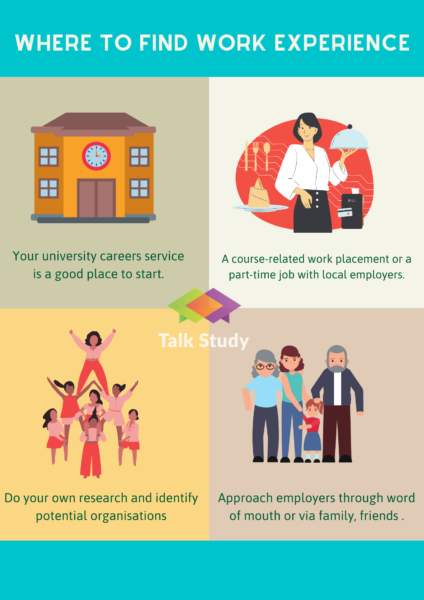Gaining work experience while studying is one of the best ways to improve your job hunt prospects. Potential employers like to see evidence that you’re actively developing core work skills and building your CV. A variety of work experience also allows you to test out possible careers and learn about a particular job, organization or sector, as well as make useful contacts. Additionally, if you’ve got your heart set on a graduate scheme with a particular organization, previous work experience with them can often open the door.
Where to look for opportunities
Your university careers service is a good place to start, especially if you’re looking for a course-related work placement or a part-time job with local employers.
But also do your own research and identify potential organizations. Don’t just go for household-name companies – smaller companies can give you just as much useful experience and are less likely to be overwhelmed by applications. Approach employers you’ve already heard of through word of mouth or via family, friends or other contacts.

It also pays to be strategic. Decide what you want to get out of the experience, such as skills gaps to plug, types of experience you want to develop or an insight into a business you’re keen to explore. Knowing beforehand why you’re interested makes it easier to write a convincing CV and cover letter.
Application tips
A direct approach is often successful with smaller organisations who can’t afford to advertise widely. Go in person with your CV and cover letter to create a great impression: look the part, and be ready to say why you’re approaching them.
Larger companies may have a formal application structure already in place – especially if they use shorter placements as a talent pipeline for their graduate schemes. Be prepared for a more competitive and longer application process.
Whatever the size of the organisation, your application materials should be targeted and focussed. While your CV may look much the same for similar roles or organisations, your cover letter is your opportunity to really stand out.
Your CV
Keep it brief: a one-page CV of relevant detail shows you can prioritise and organise information. Make the most of your key selling points: the qualities employers want to see, such as enthusiasm, curiosity, a willingness to work hard, and a desire to learn and contribute fresh ideas. Find ways to demonstrate these through concrete examples not just from previous work experience, but also from extracurricular activities and your other interests.
An example layout:
- Name and contact details
- Brief profile/objective. For example: “Bright, IT-literate English student seeking work experience in marketing communications.”
Advertisement
- Skills (optional) and experience sections, or your education section. Decide which should be most prominent depending on what you’re applying for.
Maybe you’re interested in:
8 Ways to Make a Good Impression at Work
Boost your job prospects or do what you love?
Experience section
If you’ve already done something similar, place it prominently and give details of what you learned or achieved:
Marketing communications assistant (June 2013)
Revised and polished promotional literature for Oxford Arts Festival
Highlight any instances when previous employers or supervisors were impressed by you: “Rehired three consecutive summers to help visitors at literature festival.”
Where possible, quantify the impact of your work: “Volunteered for a local charity, engaging with members of the public to raise awareness, resulting in a 10% increase in donations.“
Education section
Make the value of your studies clear to an employer. Use phrases like “trained to…” to draw out the parallels between your degree and employer needs. The Student Employability Profiles guide published by the Higher Education Academy, identifies the skills developed in different disciplines, mapping them to skills and attributes that employers value, such as cognitive skills, business awareness, and so on. For example, an English graduate can typically “use advanced literacy skills to communicate effectively in an appropriate style“; or “apply sustained written and oral arguments coherently and persuasively“
Because your education section is likely to be quite long, you can consider dividing it into sections like extracurricular activities, work placements or academic highlights. Include examples that show off your key qualities, and apply a business perspective to your achievements. For example: “Researched a range of diverse texts to co-author a blog post on sustainable living for the student magazine, gaining over 10,000 page views.”
References
Referee details are often left off CVs, but including one or two (such as tutors) can strengthen your application.
Your cover letter
Don’t just write “please find attached my CV”. Your cover letter is a crucial element of your application as you can use it to explain exactly why you’re interested in work experience at that organisation. Make full use of your research – say why you admire the organisation’s products or services, and why you’re so interested in gaining work experience there. Establish your connections and write to a person if possible, rather than “Dear Sir/Madam
For example:
Dear Mrs Smith,
My brother (name) worked for you last summer and really appreciated the chance it gave him to learn about/get hands-on experience in…
Using your work experience to maximum effect
Think about what skills you developed, what contributions you made, and write them up in powerful terms. Decide where your work experience will have the greatest impact on your CV – such as in a work experience section, or slotted into your education section (particularly if you’ve had a placement as part of your degree). Refer to your work experience in your cover letter as well, especially if it helped to confirm your career choice.
If you’ve made a good impact, ask your supervisor or manager to give you a written reference or appraisal. Feedback gives you a better understanding of your strengths, as well as areas to develop. Stay in touch with people you’ve worked with through platforms such as LinkedIn: the contacts you make now can be helpful throughout the early stages of your career.
Source theguardian.com






Recent Comments